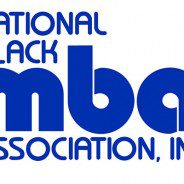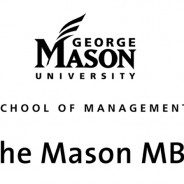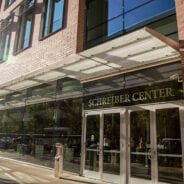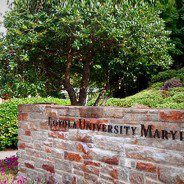Search results for :
Howard and the NBMBAA
At Howard University’s School of Business, Black MBA Associations can help you along your academic career via everything from admissions help, supporting you through your degree program and improving your career prospects. This can be valuable when you are in an online EMBA program or working full-time.
The National Black MBA Association, or NBMBAA, is the largest organization dedicated to increasing African American representation in higher education and the professional workforce. You can enroll for the NBMBAA and find local chapter information online.
Stern Dean Discusses LAUNCH Program in BizEd
In a recent article called “Solving for ‘X’”, BizEd published essays from seven business school deans about their most successful solution to the modern problems that their institutions face. One of the seven deans was Peter Henry, Dean of New York University’s Stern School of Business.
When he first became a Dean at Stern, MBA students told Dean Henry that they felt they had to focus on their job searches starting at the beginning of their business school education. The unrelenting pressure of the job search left students with little time to consider how they could use their MBA to create value for themselves and the world. Dean Henry said ‘I wanted to send them a different message, one based on “and” rather than “or.” I wanted them to understand that doing well and doing good need not be discrete activities.’
In response to these concerns, Dean Henry and the Stern faculty made significant changes to Stern’s MBA orientation. In 2011, faculty, students, and administrators came together to design LAUNCH, the nine day orientation for all incoming Stern MBA students. The orientation is designed to study social issues from four angles: World, Business, City, and U.
Each of the first three days focuses on “World,” “Business,” or “City”. Students participate in breakout sessions on the theme and hear speeches from guest speakers and faculty. Previous guests have included Roger Ferguson, the chairman and CEO of TIAA-CREF, and Cory Booker, the former mayor of Newark and current senator of New Jersey. The first three days also feature special events, like “9”, an event where nine guest speakers give nine-minute TED-style talks.
The last six days of LAUNCH focus on “U,” encouraging students to think about how they can make meaningful contributions to society. Students learn about offices of career development and student engagement, listen to advice from recent graduates, and receive mentoring. Students also get to participate in Launch Pad, a program where students create and present videos highlighting ways to create value in the world. The students then get to vote on which Launch Pad projects show the most promise.
Dean Henry emphasizes how important LAUNCH is to Stern and the school’s MBA students: “For us, LAUNCH has become both noun and verb. As an event, it is the beginning of our MBA students’ experience at Stern; it is also an active process that propels students onto a trajectory to explore how they can become more transformative leaders.”

Comparing Mason’s MBA Programs
Making the decision to advance your education at The George Mason University School of Management and bring your skills to the next level is a serious commitment and one that needs great consideration. Many business professionals struggle to decide what university to attend in order to pursue their studies and how to compare MBA programs.
It is important to compare MBA programs and their unique traits in order to gain a good perspective and find the program and institution that is the best fit for you. Most prospective students will compare MBA programs cost and location, and also whether or not they intend to go as a part-time or a full-time student.
Smeal’s Corporate Associates Program Featured in US News & World Report
US News & World Report featured Penn State University’s Smeal College of Business’s Corporate Associates Program in an article about partnerships between companies and universities. In “When Colleges and Companies Partner, All Involved Benefit,” author Chris Hassan cites Smeal’s Corporate Associates Program as an example of a mutually beneficial relationship between a college and industry. He observes that the partnership with Smeal gives companies access to accomplished MBA students and student organizations. The MBA students also benefit from the corporate relationship because they have the opportunity to interact with corporate professionals in advisory boards, case studies, and classroom lectures. The partnership also gives MBA students the opportunity to interact with corporate recruiters, and gives corporate recruiters access to talented potential employees.
The benefits Smeal, MBA students, and corporations receive from corporate partnerships extend beyond corporate support for student events. Corporate partners contribute thousands of dollars per year to sponsor services and programs at Smeal. Corporate support funds scholarship assistance, special gifts, general school support, research, and professional development activities. The companies also send Recruiters in Residence to Smeal, who offer mock interviews and resume reviewing services to students. Smeal hosts two Career Fairs every year that are only open to Corporate Associate companies.
At this time, Smeal lists twenty companies as Corporate Associates. These companies include industry powerhouses like Aldi, AT&T, Deloitte, Dick’s Sporting Goods, Heinz, Johnson & Johnson, Macy’s, PNC, PricewaterhouseCoopers, Shell Oil, and others. Smeal also has a corporate partnership with Kohl’s Department Stores.
Executive MBA
Loyola University Executive MBA Program Structure
The Loyola University Quinlan School of Business Executive MBA is an accelerated 20-month program, comprised of small 20 to 25 student cohorts. Classes meet every other Saturday. Additionally, students participate in two, one-week residencies in Chicago, and an immersive international study trip. A new cohort is admitted for the fall quarter of each year. The program begins with a student orientation prior to the start of class work.
Curriculum
The Loyola University Executive MBA curriculum focuses on building leadership and collaboration skills for experienced executives through coursework across the following disciplines: accounting, business administration, business ethics, economics, human resources, finance, information systems and operations management, legal environment, management, and marketing.
Class Profile
Admitted students have mid-to senior-level leadership roles in business or nonprofit organizations. Loyola University Executive MBA students typically have a higher level of work experience, an average of 14 years, compared to part-time MBA students. Cohorts are usually limited to 20-25 students. The average age for an EMBA student is 37. The class is 75 percent male and 25 percent female.
Careers
Most Loyola University Executive MBA students are already employed by a sponsoring employer and participate in the program as a means of increasing their value to that company. However, the Business Career Services (BCS) remains open to Executive MBA candidates, providing a full slate of career and job-search related guidance including career counseling, resume feedback, mock interviews and job posting databases.
Tuition, Scholarships, and Financial Aid
The total cost of the Loyola University Executive MBA program is $92,064. This figure includes all course materials, a personal iPad, textbooks, breakfast and lunch on class days, graduation fees, as well as flights, hotels and some meals on the cohort’s international trip.
Executive MBA students are eligible for Federal Direct Unsubsidized Stafford Loans, Federal Direct Graduate PLUS Loans, Alternative Student Loans and Merit-based Scholarships, however Quinlan generally expects at least partial employer sponsorship for Executive MBA candidates.
Admissions
Quinlan’s Executive MBA application requires a completed application form, official transcripts from all undergraduate and graduate work, two letters of recommendation, a two to three page statement of purpose, and a professional resume. Interviews are conducted on an invitation only basis.
Most accepted Executive MBA candidates at Quinlan have seven or more years of professional experience.
Application deadlines are as follows:
| ROUND | APPLICATION DEADLINE |
|---|---|
| Round 1 | May 1* |
| Round 2 | June 1 |
| Round 3 | July 15 |
Part-Time MBA
Loyola University Part-Time MBA Program Structure
The Loyola University Quinlan School of Business Next Generation part-time MBA operates on a quarter system, with new students beginning in the Fall and Spring. Generally, the fall quarter begins in late August and the spring quarter begins in late February. Courses are scheduled during evenings and weekends, which allows part-time students to work during the daytime. Students can dictate the number of courses they enroll in during each 10-week quarter. Quinlan MBA students attend a required orientation session prior to commencing the program. While Loyola University’s full-time and part-time programs operate in conjunction with one another, a part-time course load is considered to be one to two courses per quarter, though full-time status is granted to any student taking two or more classes (six hours or more) per quarter. Part-time students typically complete their coursework within 2 years.
Curriculum
The Loyola University Quinlan School of Business part-time MBA curriculum consists of 12 classes; eight core classes, up to four of which can be waived based on experience or comparable class work, and four electives. Students are able to select a concentration. Concentration options include accounting, finance, entrepreneurship, marketing, and management.
Part-Time MBA Rankings
• U.S. News & World Report: 43 (tie)
Careers
Quinlan’s Business Career Services (BCS) offers students career and job-search related guidance including career counseling, resume feedback, mock interviews and internship and job postings. Additionally, career fairs, school-sponsored networking events and on-campus interviews for many companies are arranged in Maguire Hall, the BCS office’s home. RamblerLink, BCS’s recruiting technology compiles these opportunities in one convenient location for students, connecting them to upcoming events, workshops, interview options and job postings.
Tuition, Scholarships, and Financial Aid
The cost of the Loyola University part-time MBA at the Quinlan School of Business is currently $4,488 per course.
Quinlan offers U.S. citizens and permanent residents the opportunity to apply for loans if they satisfy certain criteria. By filing the Free Application for Federal Student Aid (FAFSA), applicants may become eligible for up to $20,500 per year in FAFSA government loans as domestic students. For the fall term, the priority filing date is March 1. Quinlan graduate students are also able to apply for Graduate PLUS Loans, which come with a fixed 7.9 percent interest rate.
Quinlan automatically considers incoming students for the Dean’s Merit Scholarship based on the newly admitted student’s GPA and GMAT scores. This scholarship covers the cost of one or two courses and requires no additional application work on the part of the applicant.
Admissions
Prospective students are invited to apply to any of the four terms. Decisions are generally delivered within two weeks of the receipt of all materials by the admissions office. To apply, you must submit a completed application form, official transcripts, two letters of recommendation, a statement of purpose, official GMAT or GRE scores, and a professional resume. If you apply online, the application fee is waived, otherwise payment of $50 is required to complete the application.
International students may be asked to submit TOEFL or IELTS scores if their native language is not English. Furthermore, applicants who completed post-secondary education outside the U.S. are required to submit their transcripts to Educational Credential Evaluators Inc. for evaluation on a course-by-course basis.
Application deadlines are as follows:
| QUARTER | APPLICATION DEADLINE | QUARTER START |
|---|---|---|
| Fall | July 15 | Late August |
| Spring | January 15 | Late February |
Full-Time MBA
Loyola Marymount MBA Program Structure
The Loyola Marymount University MBA program offers small classes, personalized attention, global study opportunities, and career services while providing students with skills and experience to advance their careers. Classes are offered in the evening at the beautiful West Los Angeles campus.
The Loyola Marymount MBA program can be completed in 21 to 36 months if you go at a recommended pace of two class nights per week. However, students in the program have the option to complete the program over a longer period of time.
The first year is structured as a cohort (core classes) and the second year offers more flexibility (emphasis and electives). A new class begins each fall. As part of LMU’s real-world learning experience, the MBA program offers two international study opportunities that are unique to the curriculum.
Curriculum
The Loyola Marymount MBA program is designed for individuals with at least two years of professional or internship experience.
Students take three electives in a chosen area of emphasis (5 electives total) and eleven core courses. Three areas of emphasis include: Entrepreneurship, Finance, and Marketing. A wide variety of electives are offered each semester to help supplement the core learning experience. The program comprises a total of 51 credits.
MBA students also complete an international study program:
The Comparative Management Systems (CMS) Program gives MBA students an opportunity to gain first hand exposure to global management concepts and practices. The program requires a year of study and concludes with travel to a number of countries in a specific region of the world to meet with business executives, visit local attractions and learn about the location’s unique business environment, social culture and customs. (The CMS Program is canceled until further notice due to COVID-19)
Class Profile
There are currently over 77,000 students enrolled at LMU, including more than 22,000 graduate students. There are 52 students in the LMU MBA program, 40 percent of which identify as male and 60 percent that identify as female. About 42 percent of MBA students are of minority status. On average, these students have an average GPA of 3.3. Most students join the program with around 4 years of professional work experience.
Tuition, Scholarships, and Financial Aid
The total cost of the Loyola Marymount MBA Program is approximately $85,000. This fee includes tuition, residential and workshops, required international experience, books, and parking.
Scholarships, federal loans, and graduate assistantships are available. Scholarships are awarded based on merit and do not need to be repaid. Eligibility for scholarships can be based on academic merit, leadership, and/or talent.
All need-based financial aid and most other aid awards are determined in whole or in part by the information submitted within a student’s Free Application for Federal Student Aid or FAFSA. Students can submit their FAFSA and apply for financial aid at LMU even prior to applying for admission to LMU, and the Financial Aid Office recommends applying for aid as soon as possible.
Grants are made available by LMU, the State of California and the Federal Government to help fund the LMU education. The Financial Aid Office considers eligibility for these based on information submitted on the FAFSA.
Admissions
Applicants to the Loyola Marymount MBA programs must have completed a Bachelor’s degree or recognized qualifications equivalent to a degree, and possess at least two years of work experience. Internship experience is also acceptable.
To apply to LMU’s MBA program, applicants must submit a completed application form, college transcripts from degree-granting and non-degree-granting institutions, a current résumé and two letters of recommendation. International applicants must submit an official TOEFL score or IELTS score. The school also requires applicants to complete a personal statement. Applicants must also send in their GMAT or GRE scores and a nonrefundable $50 application fee.
Application deadlines are as follows:
Fall (August) 2021
- January 6, 2021: Early deadline.
- March 6, 2021: Priority deadline for international applicants requiring a student visa.
- May 6, 2021: Final deadline for international applicants requiring a student visa. Priority deadline for domestic applicants.
- July 6, 2021: Final deadline for domestic applicants; candidates are strongly encouraged to apply well before the deadline.
Spring (January) 2022
- November 18, 2021: Deadline for international applicants requiring a student visa.
- December 2, 2021: Deadline for domestic applicants.
Lawrence Crosby Named Dean of the Drucker School of Management
Lawrence Crosby has been chosen as the Henry Y. Hwang Dean of Claremont Graduate University’s Peter F. Drucker and Masatoshi Ito Graduate School of Management. He will also serve as a professor of management.
Babson Offers New Concentration in Business Analytics
Yesterday, Babson College announced that it has launched new concentrations in Business Analytics for its undergraduate and graduate programs. Babson referenced a 2012 in-house survey of business practitioners in which 91 percent of respondents said they would hire graduates with backgrounds in business analytics. 60 percent of those surveyed said they would be willing to pay more than a 10 percent premium to hire a business analytics graduate over a non-analytics graduate.
Babson created the new concentration using input from industry partners and Babson faculty and staff. The faculty advisors for the graduate concentration in business analytics are Abdul Ali and Dessislava Pachamanova.
“An employee with business analytics mastery will be invaluable to [their] company,” observed Cheri Paulson, the Director of Babson College’s Graduate Center for Career Development. “This is a ‘sweet spot’ for Babson students shaped from the moment they step foot on campus to become entrepreneurial leaders who can identify and create opportunities.”
The graduate concentration in business analytics is available to MBA students in the one-year, two-year, evening and Babson Blended Learning programs. Each student must complete foundational courses in basic data management, data analytics techniques and applications, and use of software related to data analytics. Students will also be able to explore business analytics through a wide range of electives. To earn the concentration, students must take a minimum of 12 credits from a list of electives including “Marketing Analytics,” “Data Mining,” “Business Intelligence,” “Information Technology,” and “Economic and Financial Forecasting.”
Although the business analytics concentration is just beginning its initial rollout, it is already popular among Babson students, according to college representatives.

Register for Sellinger’s Emerging Leaders MBA Open House
Today is the last day to register for Sellinger School of Business’ in person open house with the Emerging Leaders MBA program. Program representatives, including the assistant director of recruitment, assistant dean, program manager, faculty, students, and alumni, will join you for an engaging presentation to help you learn more about this full-time cohort MBA program.
You’ve Got Options with Howard MBA Programs
At the Howard University School of Business, there are two programs to choose from when you are ready to earn your MBA: a traditional MBA designed for students with educational background in business who are getting ready to enter the professional field, and the Executive MBA, designed for students who are already working full-time and are looking to take their corporate careers to new heights.
Wharton Professor Featured In Forbes
In an article called “The Most Dynamic Social Innovation Initiatives of 2013”, Susan McPherson honors Wharton Professor Adam Grant as one of the inspiring social innovators of 2013. McPherson claims that Grant had the “Game Changing Idea” of 2013. Professor Grant’s research suggests that people who give for authentic reasons tend to be more successful than people who are less generous. His research supports the idea that companies should attempt to hire generous people and promote employee engagement in the community.
Adam Grant is the highest-rated professor at the University of Pennsylvania’s Wharton School. He earned his Ph.D. in three years, and he is now the youngest-tenured professor at Wharton. Although he is only 31 years old, he is already one of the most well known academics in the field of organizational psychology, where he studies dynamics in the workplace. He advises companies who are trying to determine how to encourage employees to do their best work, and how to support employees so that they get the most out of their jobs.
Grant will outline his theory that people feel more fulfilled in their jobs when they have the opportunity to help others in his new book “Give and Take.” In the book, he tells a story from his undergraduate career, when he worked at a call center that helped fund student scholarships. When he brought in a student who received a scholarship to talk to call center employees about how the scholarship changed his life, the call center brought in 171 percent more revenue in the subsequent month.
In several studies of altruism as motivation, Grant has seen the same pattern over and over. When doctors were reminded that washing their hands protects patients from infection, they used 45 percent more soap than doctors who were reminded that they can protect themselves from infection when they wash their hands. His lessons also applied to the corporate world. Grant told the New York Times Magazine: “In corporate America, people do sometimes feel that the work they do isn’t meaningful. And contributing to co-workers can be a substitute for that.”

Businessweek’s Year-In-Review Highlights Entrepreneurship Program at Columbia
On New Years’ Eve, Businessweek published an article reflecting on business school trends in 2013. One of the major trends that Businessweek observed was the shift in business school students’ career objectives. Students have increasingly shown an interest in entrepreneurship over Wall Street, and prospective business school students have shown concern that the traditional MBA will not prepare them to become entrepreneurs. Business schools have had to improve their MBA entrepreneurship programs to attract students.
In their 2013 reflection article, Businessweek highlighted the hands-on entrepreneurship course, Lean LaunchPad, which was founded by professor and serial entrepreneur Steve Blank. The course is available at Columbia Business School, the University of California-Berkeley’s Haas School of Business, and Stanford’s engineering school.
Instead of teaching students how to write a business plan, Blank encourages aspiring entrepreneurs to know their customer and test their hypotheses about their business. In his class, teams of students begin developing a product or service, while talking to 10 to 15 people a week for feedback about challenges they face in their business. Students’ grades in the course are based on their weekly presentations about what they’ve learned by talking to people. Blank believes his approach teaches students to change their ideas to better fit their clients’ needs.
The Lean LaunchPad program has become successful. The National Science Foundation has adapted Lean LaunchPad to teach scientists how to commercialize their ideas. As of April, 75 professors per quarter were receiving training to teach the course. It seems like Lean LaunchPad’s unorthodox approach to teaching entrepreneurship has really resonated with institutions that want to train the next generation of entrepreneurs.

To Deduct, or Not To Deduct? IRS Wins Tuition-Deduction Case Against an MBA
The US Tax Court recently ruled that an MBA graduate at Rollins College in Florida improperly deducted his MBA tuition expenses from his 2009 tax return. Continue reading…
St. John’s University Highlights Professor John Neumann
This week, St. John’s University’s Peter J. Tobin College of Business news highlighted John Neumann, D.B.A, an associate professor of finance. Neumann is also the faculty director of the Financial Information Lab at St. John’s University.
John Neumann has an undergraduate degree from the University of Pennsylvania. He began his business career in industry, working in information systems for Accenture, Robert A. Stanger & Co., Inc., and AT&T. He earned a doctorate in business administration from Boston University, and then became a professor at St. John’s University.
Professor Neumann had the opportunity to help with the design of the Financial Information Lab. The facility has now been in operation for six years. The lab is used by marketing, finance, risk management, and decision sciences students. The lab provides resources that business professionals use to develop business strategies or create and manage portfolios.
Neumann used his information technology experience to help with the design of the Financial Information Lab. He helped chose the technology and review the plans for the facility. The lab is equipped with essential technologies for business professionals, including FactSet, a collection of databases and analytical tools; the Bloomberg suite, a collection of financial tools; a Tracker Board with real-time updates on the College’s two student-managed portfolios and general financial market performance; and 33 computer workstations with dual monitors. Neumann observes: “When you bring a class in here, it’s because you need to access the data that our system provides. There is a real benefit to having students become proficient with a Bloomberg terminal or FactSet software.”
Newmann teaches two investment courses for St. John’s Student-Managed Investment Funds. One of the courses is intended for MBA students and the other is designed for undergraduates. In the class, students have the opportunity to manage real portfolios valued at a combined $3 million. He uses the Financial Information Lab for his own classes.
Kogod Does NYC: The New York City Site Visit Trip
Many students choose American University’s Kogod School of Business when pursuing careers in public policy, law, government, and international relations—after all, what better place to be then Washington, DC for MBAs looking to accell in those fields?
However, students interested in the fields of media and marketing only need to look a bit further north to find the same kind of opportunities. This January, 75 Kogod students will travel to New York City for the 11th annual New York City Site Visit Trip and experience for themselves the inner workings of 22 media and marketing companies.
MetroMBA’s Top MBA News Stories of 2013
The year 2013 has brought some fascinating developments in the business school world. From top schools announcing the release of open enrollment online courses to a new program that re-envisions the MBA to the launch of everyone’s favorite metro-focused MBA news site, this year has made many new options available for prospective business school students. On New Year’s Eve, we would like to reflect on the year 2013 by providing you with a list of the top stories we have covered this year.
1. Top business schools offer MBA courses online for free
In September, the University of Pennsylvania’s Wharton School announced that it would offer four new Massive Open Online Courses (MOOCS) , including Marketing, Corporate Finance, Operations Management, and Financial Accounting. These courses provide most of the core knowledge that students learn in their first year at Wharton. In October, business school news sites hinted that Harvard Business School was developing an initiative to offer online courses. In December, the Massachusetts Institute of Technology’s Sloan School of Management followed suit, announcing that they would offer a popular data analytics course for free through MIT’s edX.
The latest MOOC offerings represent a great opportunity for potential business school students. Prospective students can try an MBA class to help determine if business school is right for them, or they can use the online classes to get back into an academic mindset before business school. The courses could also provide useful information for prospective students with weaker backgrounds in particular business school subjects.
Continue reading…
11 Months, 4 Continents, 5 Cities: The Quinlan IMBA
Many people travel to enrich their sense of culture; MBAs at Loyola University’s Quinlan School of Business travel to enrich their business savvy. Quinlan’s Intercontinental MBA allows you to earn the credentials needed to take your career to the next level.
The program carries a focus on emerging markets and uniquely combines online study with residencies on four continents over the course of an intensive, one-year, full-time cohort program. Throughout your travels, you’ll learn how business is conducted in Beijing, Chicago, Istanbul, New York City, and Santiago, while being able take your remaining courses online.
Here’s the program by the numbers:
- 100 days of travel
- 4 continents
- 5 cities
- 11 months
So if you are looking to differentiate your résumé in today’s competitive global marketplace and position yourself for employment (The 2012 NACE Job Outlook reported that 18.6 percent of employers plan to hire international business graduates) while expanding your horizons with travel to four continents, then register for the Fall 2014 cohort.

















